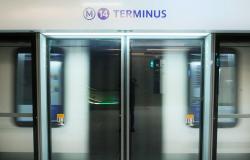“It’s hyssop. Drink it! “, intimate May Bitar by pouring the infusion into flowery cups. “As David wrote in the Psalms, this plant will make you clean. » Sitting on an armchair in her plush living room in Jaramana, east of Damascus, this mother smokes thin cigarettes. At its feet, a wooden nativity scene sits under the plastic tree. May did not wait for the night of the Nativity to place the figurine of Jesus on its tiny layer of straw.
“Every day, I look at him for hours, and I think about his difficult life… Like him, our existence is made of suffering and sacrifices,” she whispers. Born less than a year after Hafez Al Assad took power, at the head of the country between 1971 and 2000, May has only known dictatorship. So, when his heir, Bashar Al Assad, was ousted on December 8, a world collapsed.
Far from the euphoria that has invaded the streets of the capital for a week, this Greek Orthodox woman is consumed by anxiety. “People feel liberated? Me, I don't know. With the old regime, at least, there was a certain stability. confides May. Next to her, her only son, Camil, agrees without conviction. The 23-year-old young man is stunned by the fall of Al Assad.
“We thought they were almost immortal,” breathes this medical student, dressed in a gray sweatshirt. He admits to having voted for the dictator in the last elections in 2021. The latter was then re-elected with 95% of the votes against two puppet candidates. “I thought he guaranteed our security, but he abandoned the country overnight like a coward, he says. We were blind. It is only today that we are discovering the extent of his crimes. »
“We dive into the unknown”
Like all Syrians, the Bitar family suffered from the regime's oppression and the thirteen years of conflict that destroyed the country. A life punctuated by shortages of electricity, food, medicine and the echo of bombs falling around Damascus. “I was afraid in my stomach that my son would be killed, May remembers. The war may be over, but now we're plunging into the unknown. » With the advent of rebels dominated by the Islamists of Hayat Tahrir Al-Cham (HTC), this director of a Christian school fears for the future of her community. “I try to reassure my teachers and my students. That's my role. But in truth, I'm terrified. »
Pulling up her white scarf over her impeccable hair, she asks: “Do you think I’m going to have to wear a scarf, or take off my cross? » In the province of Idlib, controlled by HTC since 2019, Christians have been forced to comply with its radical doctrine. On the borders of this very conservative region of northwest Syria, women cannot go out without a hijab. Priests can still celebrate mass, but they are prohibited from ringing the bells of the only church. Rules that the new masters of Damascus promise not to apply in the rest of the country.
The Maronite Archbishop of Aleppo, Mgr Joseph Tobji, testifies to this: since the capture of Syria's second city at the end of November by HTC, the bells of the Aleppo churches continue to ring. On Monday, December 9, the archbishop posed with the city's Christian religious leaders in a group photo, with leaders of these Islamist groups. This is the second time that such a meeting has been held in the Franciscan convent. “They talk to us about citizenship, religious freedom…”he says. They assure us that our lives will not change, but we wait to see the facts. »
85% of Christians have left Syria since 2011
In Homs, to the west, Syriac Catholic Archbishop Jacques Mourad wants to believe that these Islamist groups have nothing to do with Daesh, which held him captive for several months in 2015. “These young people who overthrew Bashar Al Assad are part of the 8,000 Syrians chased out by the regime during the war. Today they want to be free, have the right to express themselves and functional justice»he enthuses.
“It's a little too good to be true, but they seem willing to make concessions, so let's give them a chance…” slips sister Jihane Atallah on her side. This nun from the Congregation of Charity of Sainte-Jeanne-Antide-Thouret, working in the educational field, came to visit the Bitar family in Damascus. “We must be careful not to move from one extremism to another. Bachar presented himself as the protector of Christians, but he was a monster. » From now on, the nun prays forwhatall religious communities dialogue and build “the new free Syria”.
While 85% of Christians have already left the country since 2011, the stakes are existential. May no longer counts her expatriate friends whose parents she takes care of, too old to take the road to exile. “I'm afraid we'll have to flee too, she blurted out in a sob. I don't want to leave my house. I love my country so much. » But the mother is already preparing to perhaps see her son leave. In an economically depressed country, prospects are slim for young Syrians. “I will do according to the best opportunities”, evades Camil, as if to spare his mother. With the very likely lifting of Western sanctions and the reopening of the airport promised by the rebels, he hopes to soon be able to fly to Europe. “At least for the holidays!” I want to tour the football stadiums that I see on TV. »
The promise of having a role to play
Because insecurity persists. In Aleppo, Carla Audo, 34, stays to take care of her parents, and to maintain her mission within the NGO Hope Center, working with the more than 5,000 Christians who were thrown onto the roads at the start of the Islamist offensive. A minority, Christians indeed play a crucial role in Syria. “With our schools and hospitals, we have “expertise” in education and social care,” agrees the Archbishop of Aleppo, Mgr Joseph Tobji.
But will Christians even have their place in the reorganization of the country? “We were assured that minorities would have a role to play in the new governmentexplains Mgr Mourad. This was already the case in the era of Bashar Al Assad, where we happened to have two Christian ministers. » Does their image, thus associated with the old regime, risk harming them in the future? Too early to say yet. Director of the Christian Institute of the Orient (ICO) in Paris, Antoine Fleyfel believes that those who were benevolent towards the Assads were so. “certainly by choice of the less worse”. Either way, Christians have no other option now “than to base their hope in the fall of the regime”, he supports, convinced that“They will play their role in Syria whenever they can. We still have to give it to them.”
———
Communities in the process of being erased
Since 2011, the Syrian civil war caused a mass exodus of Christians. Their presence has fallen from 8% to 2% today in this country of 23 million inhabitants, mainly Sunnis.
On the Latin side, the most represented communities are the Melkite Greek-Catholics and the Syriac-Catholics. Also present are Maronites, Chaldeans, Armenians…
On the Orthodox side, the Greek Orthodox community is large.
In recent yearsjihadist groups destroyed numerous churches and monasteries – some of which dated from the first centuries – erasing a significant part of Syrian Christian heritage.
The country's economic collapse and continued political instability prevent the return of Christian families to the country.






